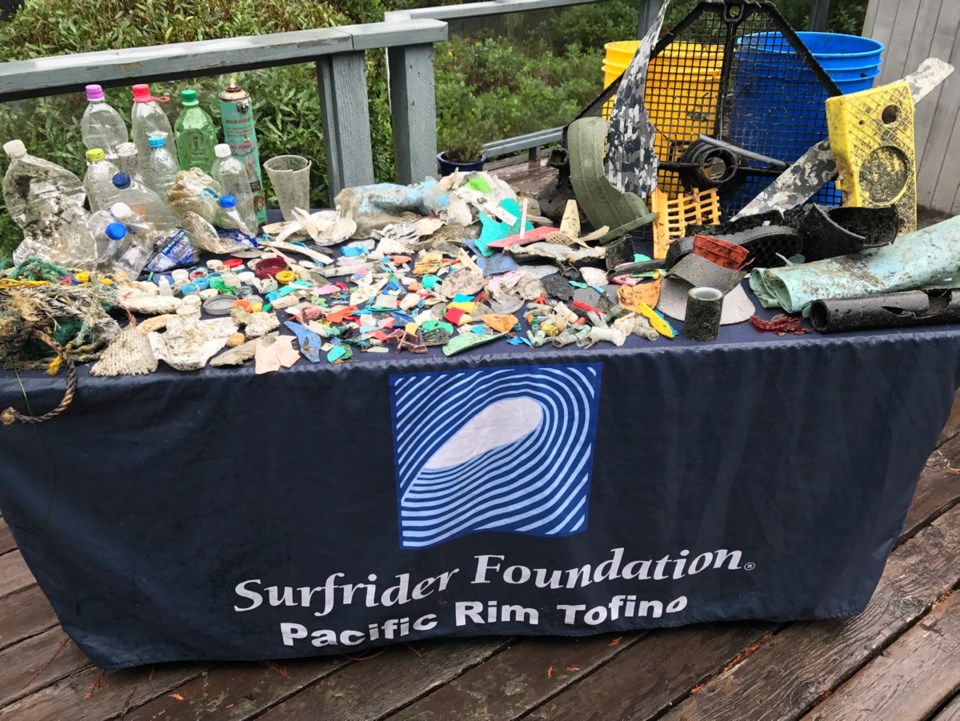 Banning single-use plastics was an easy sell in Tofino, says Mayor Josie Osborne.
Banning single-use plastics was an easy sell in Tofino, says Mayor Josie Osborne.
Three-quarters of the tourist town’s businesses had already ditched plastic bags by the time the politicians got involved. Ninety-five per cent had done away with plastic straws.
Doing so was only natural in a place where the consequences of our insatiable appetite for disposable whatevers wash ashore with depressing regularity, as jarring as a clearcut in the Garden of Eden. “You go down to the beach and you see plastic bags, you see straws, you see plastic lids,” Osborne said. Can’t help but think of all that junk breaking down and ending up in the ocean food chain. “It’s such a visible reminder.”
Note that it’s municipalities bordering saltwater — Tofino, Ucluelet, Victoria, Saanich, Esquimalt, Colwood, Sooke, Qualicum Beach, Nanaimo — that have been ahead of the curve on this issue, wading in (as it were) long before Justin Trudeau announced his intention Monday to bring in a nationwide prohibition on single-use plastics.
Osborne was happy to hear Trudeau’s announcement, particularly the part where he spoke of making manufacturers take more responsibility for collecting and recycling the goods they produce (B.C. already has 22 such agreements with industry). But she also looks forward to the prospect of federal legislation catching up to and supplanting the hodgepodge of regulations now emerging as individual municipalities pass their own bylaws.
“It’s much better to take a provincial or federal approach,” she said. The business community and consumers alike must go nuts trying to figure out which municipalities allow them to use which plastic products, and which ones require them to sell other types of bags for how much.
That’s one reason Tofino and Ucluelet acted jointly in passing the twin bylaws that took effect Saturday on World Oceans Day. It would be too confusing to ask tourists to be subjected to differing rules in communities that are so close together (the 345 municipalities here in Dysfunction-By-The-Sea might want to ponder this approach).
The new rules make the two west coast towns the first in the province to ban plastic straws and among the first to prohibit single-use plastic bags. As with similar bylaws elsewhere, there are exemptions: garbage bags and bags for meat, fruit and vegetables, bulk items, baked goods and so on. Stores may provide other types of bags to customers, but only if they ask for them, and they must charge at least 25 cents for a paper bag and at least $2 for a reusable one.
That follows the pattern set by Victoria, which brought in its own plastic bag ban in 2018. The city requires merchants to charge 15 cents for paper bags and $1 for reusable ones, though those fees will rise to 25 cents and $2 respectively on July 1. That’s also the day Qualicum Beach’s bag-and-straw ban begins. Saanich, Esquimalt, Colwood and Sooke — where council was to vote on a bylaw Monday night — are all on track to have single-use bag bans in effect Jan. 1. Nanaimo just wrapped up a consultation process to figure out what the public wants. (Parksville, meanwhile, rejected a ban.)
Osborne says Tofino and Ucluelet plan to expand their list, banning such items as Styrofoam take-out containers. That won’t please those who have complained to her about the way the Nanny State is marching into the marketplace. Nor will it thrill those who are simply uncomfortable with change (though the mayor argues that the prospect of altering habits is often harder than actually doing so).
But it can be argued that our addiction to disposable plastic is itself a recent lurch in direction. Most of the disposable items we now take for granted became popular only in the past few decades. The plastic shopping bags we’re trying to get rid of weren’t widely used in grocery stores until the mid-1980s. The U.S. went from 350,000 tons of disposable diapers in 1970 to 1.9 million tons in 1980. We don’t think twice about chucking out all manner of goods — sandwich cases, soda-fountain cups, fast-food cutlery, the plastic clamshells that hold cherry tomatoes — in a manner that would give our grandparents the vapours.
We suffer from what environmentalists call “generational amnesia.” It’s the idea that what we take as normal today was not, in fact, normal to those who came before us. It wasn’t long ago that the salmon queued up to bite your line, our resident orcas were plentiful enough that we didn’t know them all by name, and the oceans weren’t choked with plastic that, like Zdeno Chara, might break down but will never go away.
Banning single-use plastics won’t save us from driving off the cliff, but at least it will take our foot off the gas.


